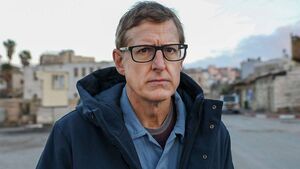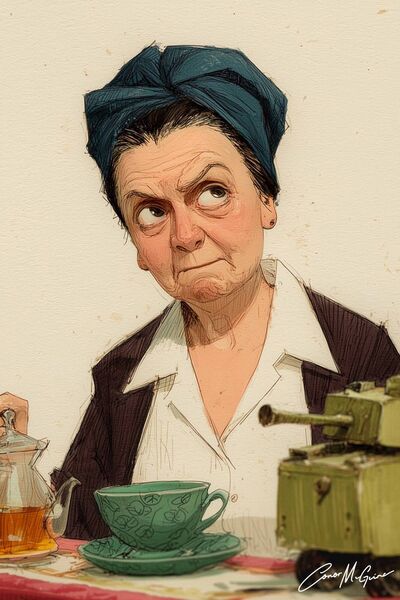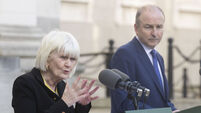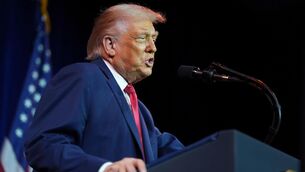Ordinary people can become architects of extraordinary cruelty

Louis Theroux: The Settlers
Louis Theroux has always possessed an uncanny talent for making monsters seem ordinary, but in his latest documentary, , he encounters subjects who have already mastered that transformation themselves. Watching a 79-year-old grandmother cheerfully discuss ethnic cleansing over tea and biscuits in her suburban sitting room becomes an exercise in cognitive dissonance. Yet this is precisely what Louis Theroux delivers in , a film that manages to be both utterly familiar in its methodology and genuinely shocking in its revelations. Theroux has always possessed an almost supernatural ability to make the extreme seem mundane, but here he's dealing with subjects who have already achieved that transformation, accompanied by preening self-congratulation.
Daniella Weiss, the so-called "godmother" of the Israeli settler movement, receives Theroux in her home in Kedumim with the kind of hospitality one might expect from any suburban hostess. The walls are adorned with family photographs and books; the atmosphere is one of cosy domesticity. It's only when she unfurls her map of Greater Israel - encompassing Lebanon, Jordan, and chunks of Syria, Saudi Arabia, and Iraq - that the full scope of her ambitions becomes clear. This isn't merely about the West Bank; it's about rewriting the geography of the Middle East entirely.
What makes Weiss so compelling and so disturbing is her absolute lack of self-consciousness about her views. When Theroux suggests that her advocacy for the removal of Palestinians would constitute a war crime, she laughs with genuine amusement.
"It's a light felony," she responds as if discussing a parking ticket.
This isn't the calculated rhetoric of a politician or the fevered ranting of a street-corner prophet; it's the matter-of-fact certainty of someone who has never seriously entertained the possibility that she might be wrong.
The documentary gains its power from Theroux's decision to allow his subjects to speak without interruption. Weiss boasts about having 800 families ready to settle in Gaza, even as the territory smoulders in the background. She speaks of Palestinians needing to "go to Turkey, to Canada - anywhere else" with the casual dismissiveness of someone discussing an infestation problem. When Theroux raises the issue of settler violence, Weiss's response is instructive. She suddenly pushes him hard in the chest with both hands, then immediately launches into an explanation of how such footage might be manipulated - how the camera could capture only his theoretical retaliation, painting him as the violent party. The demonstration is breathtaking in its cynicism, delivered with the assurance of someone accustomed to operating without accountability.

Theroux understands that horror often wears a cardigan. The documentary's most disturbing revelation isn't the extremism itself but how thoroughly it has been domesticated. Weiss's suburban respectability makes her views all the more chilling. She's not a wild-eyed fanatic screaming from a soapbox; she's a well-spoken, educated woman who happens to believe that millions of people should be forcibly removed from their homes. It's Hannah Arendt's banality of evil made manifest, complete with floral wallpaper and family photos.
Theroux's other primary subject, Ari Abramowitz, presents a different kind of disturbing certainty. A Texas-born settler who arrived in Israel as a teenager, Abramowitz has constructed an entire worldview around the notion that Palestinians simply don't exist.
"I'm so uncomfortable using the word 'Palestinian'," he tells Theroux, "because I don't think it exists."
This isn't ignorance; it's wilful blindness raised to the level of ideology. Abramowitz, armed with both rifle and handgun, speaks of defending "the entire Western world" from his illegal outpost as if his presence in occupied territory represents civilisation's last stand.
The documentary's most devastating moments come when Theroux ventures into Palestinian areas with his subjects. In Hebron, where 700 settlers live among 200,000 Palestinians under military protection, the architecture of oppression becomes visible. Shuttered shops, arbitrary checkpoints, and the constant presence of armed soldiers create a landscape of systematic humiliation. When Theroux asks a Palestinian activist why he can't take a direct route home, the answer is simple: the roads are forbidden to him. This isn't the chaos of war; it's the ordered brutality of occupation.
What emerges from these encounters is a picture of a system designed to make everyday life impossible for Palestinians. Soldiers stop olive harvesters for no apparent reason. Checkpoints proliferate like a virus. Basic movement becomes an act of navigation through a maze of prohibited zones. The goal isn't subtle: to make life so difficult that people will simply leave. It's ethnic cleansing by administrative tedium, death by a thousand bureaucratic cuts.
Theroux's evolution as a filmmaker is evident throughout. Gone are the knowing winks and calculated naivety of his earlier work. He's still polite, still curious, but there's a steel beneath the surface that wasn't there before. When he tells Weiss that her views "seem sociopathic", it's not a provocation but a diagnosis. The woman who claims to care only about "her people" and gives no thought to others has, quite literally, defined herself as a sociopath.
The documentary's broader implications are deeply troubling. What we're witnessing isn't some ragtag collection of zealots operating from the fringes - this has become a legitimate political constituency with actual seats at the cabinet table. Ben-Gvir, now wielding the considerable powers of national security minister, features prominently in the documentary as he works settler crowds into a frenzy at their rallies. The radicals haven't just knocked on the door of power; they've moved in, redecorated, and are now using the state's resources to pursue their dream of an ethnically pure Greater Israel.
Perhaps most unsettling is the religious dimension of the settler project. These aren't secular nationalists pursuing strategic goals; they're religious zealots who view the Old Testament as a property deed. Rabbi Dov Lior's casual reference to Palestinians as "camel riders" who need to be "cleansed" from the land isn't political rhetoric - it's theological conviction. When God is your estate agent, international law becomes irrelevant.
The film's Palestinian subjects provide a necessary counterpoint to settler certitude. Issa Amro walks Theroux through Hebron's dead zones with the quiet determination of someone who refuses to disappear quietly. Speaking to foreign cameras when you're Palestinian isn't brave - it's borderline reckless, yet he does it anyway, clinging perhaps to some fading belief that international attention might actually matter. His harassment by settlers and soldiers following the broadcast wasn't surprising; it was inevitable. The occupation depends on darkness, and Amro had switched on a very bright light.
Theroux's achievement here is to make the invisible visible. The settler project operates largely beyond the gaze of international media, dismissed as a fringe phenomenon by those who prefer not to confront its implications. By allowing settlers to speak in their own words, Theroux strips away the comfortable fiction that this is somehow a marginal movement. These are people with guns, government backing, and an absolute certainty that they're doing God's work.
The documentary's title is perfectly chosen. These aren't just people who've moved to the West Bank; they're settlers in the deepest sense; colonists who've arrived to claim land and remake it in their image. Like all settlers, they've convinced themselves that the land was empty when they arrived, that the people they've displaced were never really there at all.
is essential viewing not because it tells us anything new about the Israeli-Palestinian conflict but because it forces us to confront the human face of systematic oppression. In Daniella Weiss's suburban sitting room, over tea and conversation, we see how ordinary people can become architects of extraordinary cruelty. It's a reminder that the greatest crimes are often committed by those who sleep soundly at night, secure in their certainty that they're the heroes of their own story.





